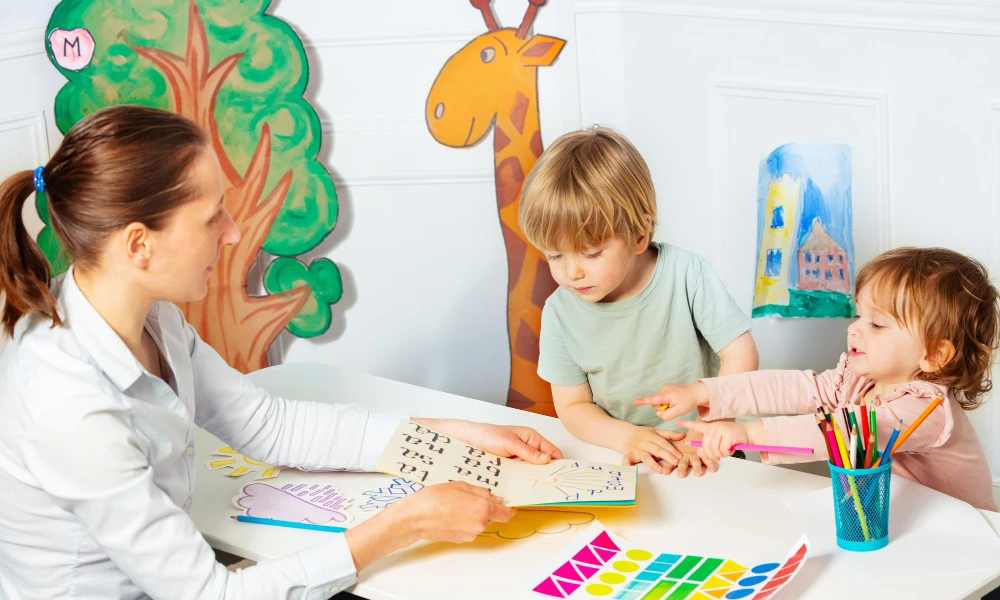October 1, 2025 admin
Working in a nursery is one of the most rewarding careers you can choose. You’ll watch young children learn, grow, and develop new skills every single day. But what childcare qualifications for nursery work do you actually need?
This guide explains everything about nursery qualifications in the UK. Whether you’re just starting out, changing careers, or already working in early years, you’ll discover which qualifications you’ll need and how to get them. We’ll cover Level 2 and Level 3 options, nursery assistant roles, and the best routes into this fulfilling career.
By the end, you’ll know exactly which early years qualification suits your goals and how to work in a nursery successfully.
Understanding Nursery Qualifications in the UK
Nursery qualifications matter because they keep children safe and support their development. The Department for Education sets clear standards about who can work with young children and what training they need.
Not all childcare courses count as approved qualifications. Only courses on the early years qualifications list are recognised for nursery work. These “full and relevant” qualifications prove you have proper training in child development, safety, and care and education.
Nursery settings must maintain specific ratios in early years settings. This means having enough qualified staff for the number of children. Only staff with approved qualifications count towards these ratios. Without the right early years qualification requirements, you cannot work unsupervised with children.
The early years qualification requirements and standards ensure every child receives quality care from trained professionals. These rules protect children whilst giving you the skills to support their growth effectively.
Essential Qualifications to Work in a Nursery
Three main qualification levels open doors to nursery work. Each level offers different responsibilities and career opportunities in the early years sector.
Level 2 Childcare Qualification
A Level 2 childcare qualification is your starting point for nursery work. This course teaches you the basics of working with small children and young children safely. You’ll learn about child development stages, health and safety, and how to support daily routines.
The Level 2 childcare qualification UK requirements are straightforward. You typically need GCSEs in maths and English at grade C/4 or above. If you don’t have these, some providers accept functional skills instead. The course takes around 6-12 months to complete.
Study options include classroom learning or an NVQ level 2 childcare online course free through certain funding schemes. You’ll need work placement hours in a real nursery setting to practise your skills. This hands-on experience is essential for understanding nursery assistant roles and responsibilities.
With Level 2, you can work as a nursery assistant under supervision. You’ll help prepare activities, support children at mealtimes, and assist with nappy changing. Many people start here and work towards higher qualifications later.
Level 3 Childcare Qualification
The Level 3 childcare qualification takes your career further. This qualification allows you to work as a Level 3 early years educator with full responsibilities for children’s learning and development.
What makes Level 3 different? You gain deeper knowledge of the early years foundation stage (EYFS) framework. You’ll plan activities, observe children’s progress, and work independently as a key person. This level counts in staff ratios, making you more valuable to employers.
Many training providers now offer a Level 3 childcare qualification online. This flexible option suits people already working in early years or those with family commitments. Online study takes 12-18 months typically, with regular assessments in your workplace.
As an early years educator, you’ll guide children’s learning across all EYFS areas. You’ll communicate with parents and carers, maintain records, and support less experienced staff. The Level 3 qualification opens senior practitioner and room leader positions.
Level 3 Early Years Educator Apprenticeship
A Level 3 early years educator apprenticeship combines work and study perfectly. You’ll earn a salary whilst gaining your qualification through on-the-job training and qualifications.
Apprenticeships suit people who learn by doing. You’ll spend most time working in a nursery setting, with dedicated study time each week. Your employer supports your learning, and you’ll have an assessor who visits regularly.
The apprenticeship route works brilliantly for those already working in early years in assistant roles. You can progress to qualified educator status without leaving your job. Most apprenticeships take 12-18 months, and you’ll gain the same Level 3 qualification as classroom students.
Nursery Assistant Qualifications and Roles
Nursery assistant qualifications prepare you for hands-on work with children every day. Understanding nursery assistant roles and responsibilities helps you decide if this career suits you.
What do nursery assistants actually do? You’ll arrive early to prepare rooms and activities. Throughout the day, you’ll play with children, read stories, and help with personal care. You’ll support meal times, outdoor play, and rest periods. You’ll clean toys, change nappies, and comfort upset children.
Nursery assistants work under the guidance of qualified early years educators. You’re an essential part of the nursery staff team. Without assistants, nurseries couldn’t function effectively or maintain proper child-to-staff ratios.
Many nurseries offer voluntary or paid positions for people gaining experience before formal qualifications. This experience-based route for early years work helps you understand the role before committing to training. Some settings hire enthusiastic beginners and support them to work towards a qualification.
The path from assistant to senior roles is clear. Start with Level 2, gain experience, then progress to Level 3. Many nursery managers and room leaders began as assistants. Your journey in early years careers can take you as far as you want to go.
Advanced Nursery Qualifications
Beyond Level 3, higher qualifications open leadership and specialist roles in nursery schools and early years settings.
Level 6 and Degree Qualifications
A Level 6 qualification means degree-level study in early childhood. Options include a foundation degree in early childhood studies or a full degree in early childhood studies. These courses take 2-3 years and cover child development, psychology, and education theory in depth.
The Open University offers flexible degree routes perfect for working professionals. You can study part-time whilst continuing nursery work. A bachelor’s degree in early years opens management positions, quality improvement roles, and specialist support work.
With Level 6 qualifications, you might become a nursery manager, area manager, or early years consultant. You’ll oversee multiple staff, manage budgets, and ensure high standards across settings. These roles combine your passion for children with leadership responsibilities.
Early Years Teacher Status
An early years teacher works differently from nursery nurses and educators. Early years teachers hold qualified teacher status and usually work in nursery schools attached to primary schools. They plan curricula, lead teams, and focus on preparing children for reception classes.
Gaining early years teacher status requires teacher training through a university or school-direct route. You’ll need a bachelor’s degree first, then complete postgraduate training. Some universities offer specialist early years teacher programmes.
The difference between nursery nurse qualifications and teacher qualifications is significant. Teachers have degree-level education and focus more on educational outcomes. Nursery nurses and educators provide excellent care and education but don’t need degrees. Both roles are valuable in early years settings.
Where to Study: Training and Qualifications
Choosing where to study matters as much as which qualification you pick. The UK has a wide range of training providers offering different learning styles.
Local colleges offer classroom-based childcare courses with regular attendance. This traditional route suits people who prefer face-to-face teaching and peer support. You’ll attend several days weekly and complete assignments between sessions.
Online training providers offer Level 3 childcare qualification online and Level 2 courses too. Study from home at times that suit your schedule. You’ll still need work placement, but theory learning fits around your life. This flexibility helps career changers and parents returning to work.
Apprenticeship providers work with employers to deliver qualifications through a range of workplace-based routes. You’ll attend some classroom sessions but mostly learn whilst working. Your employer pays your wages, and the government funds training costs.
Cambridge Open College specialises in flexible online childcare qualifications. Our courses suit busy people who need to study around work and family. We provide tutor support, help arrange placements, and guide you through every step towards qualification.
Whatever route you choose, check the provider offers approved qualifications recognised by the Department for Education. Only these count for nursery employment.
Entry Requirements for Nursery Qualifications
Understanding entry requirements helps you plan your route into nursery work. Requirements vary by qualification level but follow similar patterns.
For Level 2 courses, you’ll need GCSEs in maths and English at grade C/4 or above. Some providers accept equivalents like functional skills or NVQ or BTEC qualifications in these subjects. If you don’t meet requirements, foundation courses can help you reach the needed level.
Level 3 qualification entry typically requires a Level 2 in childcare first. However, mature students with relevant work with children experience might enter Level 3 directly. Each provider sets their own entry requirements, so ask if you’re unsure about eligibility.
All nursery work requires DBS checks (Disclosure and Barring Service). This criminal record check ensures you’re safe to work with children. Your training provider or employer will arrange this. You cannot start work placement without clearance.
Some people gain experience through voluntary work before formal qualifications. Working as a volunteer in nurseries, playgroups, or schools demonstrates commitment. This prior experience strengthens your application and helps you understand what to expect.
Health checks may be required before starting work placement. You’ll need to confirm you can meet the physical demands of nursery work and have no conditions that might affect child safety.
Building Your Career in Early Years
A career in early years offers clear progression paths and diverse opportunities. Starting as a nursery assistant can lead anywhere you choose.
After gaining Level 2, many people work in nurseries whilst studying for Level 3. This career in early years approach lets you earn and learn simultaneously. Employers value staff who show commitment to professional development.
With Level 3, you might become a room leader within 1-2 years. Room leaders manage specific age groups, supervise assistants, and take responsibility for children’s planning. This role builds leadership skills whilst keeping you close to children.
Senior practitioners and deputy managers need Level 3 plus several years’ experience. These roles involve staff training, parent communication, and quality improvement. You’ll still work directly with children but also support the wider team.
Nursery managers typically hold Level 5 or Level 6 qualifications. After several years at senior level, management becomes possible. Managers handle budgets, recruitment, inspections, and strategic planning. It’s a business role but rooted in your passion for early years education.
Alternative early years careers include childminder work, where you run your own home-based childcare business. Childminders need Level 3 minimum and must register with Ofsted. This route offers independence and flexibility.
Some early years professionals move into training, becoming tutors for new childcare students. Others specialise in special educational needs, working with children who need extra support. The early years sector offers varied childcare career paths beyond nursery work.
Whatever direction you choose, continuing professional development matters. Attend training courses, read current research, and stay updated on EYFS changes. Working in early years means constant learning, which keeps the career interesting and rewarding.
Understanding the Early Years Foundation Stage (EYFS)
Every nursery in England must follow the early years foundation stage statutory framework. Understanding EYFS is essential for anyone wanting to work in a nursery.
EYFS covers children from birth to five years. It sets standards for learning, development, and welfare in all early years settings. The framework includes seven areas of learning: three prime areas (communication, physical development, personal and social development) and four specific areas (literacy, maths, understanding the world, and expressive arts).
Why do nursery staff need EYFS knowledge? Because you’ll plan activities around these areas. You’ll observe children to track their progress and identify next steps in their learning. Your daily work directly supports children’s development across all EYFS areas.
The framework balances care and education beautifully. Young children learn through play, so your job combines keeping them safe, meeting their needs, and providing rich learning experiences. You’ll set up messy play, organise outdoor adventures, and create opportunities for children to explore and discover.
Understanding child development underpins everything in EYFS. You’ll learn typical development patterns and spot when children need extra help. This knowledge helps you support each child appropriately and work effectively with parents and carers.
EYFS also covers safeguarding, health and safety, and inclusive practice. These crucial aspects protect children whilst ensuring every child can participate fully in nursery life.
Getting Started
Ready to begin your journey towards working in a nursery? Here’s how to take your first steps into this rewarding career.
First, decide which level suits your current situation. If you’re completely new to childcare, Level 2 is the right starting point. If you have relevant experience or already work in nurseries, consider whether Level 3 might suit you better.
Research training qualifications available in your area. Look at local colleges, online providers, and apprenticeship opportunities. Check each provider’s reputation by reading reviews and checking their pass rates. Ensure qualifications you can take are on the official approved list.
Think about funding options. Some courses are fully funded for eligible learners, especially if you’re aged 19-23 without a Level 2 qualification. Universal Credit claimants might access additional support. Apprenticeships are fully funded by government and employers.
Contact providers to discuss your circumstances. Good training organisations answer your questions patiently and help you understand what’s involved. Ask about placement support, study time commitment, and assessment methods.
Before enrolling, try gaining experience if possible. Volunteer at local nurseries, help at playgroups, or assist at children’s clubs. This experience confirms whether nursery work suits you and strengthens your training application.
Prepare for the commitment. Studying whilst working or managing family takes dedication. However, thousands of people successfully gain childcare qualifications every year. With good organisation and determination, you can too.
Conclusion
Childcare qualifications for nursery work give you the skills and knowledge to make a real difference in children’s lives. Whether you choose Level 2 to start as a nursery assistant or aim straight for Level 3 as an early years educator, you’re beginning a valuable career.
Remember, nursery assistant qualifications and higher levels are available through various routes. Online courses, apprenticeships, and classroom learning all lead to the same approved qualifications. Choose the path that fits your life and learning style.
At Cambridge Open College, we understand that life is busy. Our flexible online childcare courses let you study when it suits you. We support students throughout their journey, from enrolment through to qualification. If you’re ready to explore our Level 2 childcare qualification or find out more about our Level 3 early years educator course, we’re here to help.









